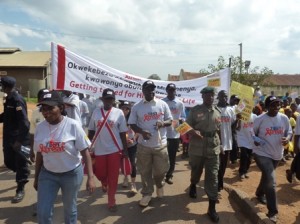like Aids Healthcare Foundation have even taken this a notch higher. The organisation in December 2010 launched a HIV Test and Treat campaign to ensure that all people who are tested and found to HIV positive are put on some form of treatment.

“We want to introduce those who are found HIV positive to some form of immediate care including for TB and HIV/AIDS related opportunistic infections. We shall follow up all the people we are treating to ensure they continue to receive necessary HIV/AIDS treatment,” says Dr. Mina Nakawuka, the Director of Advocacy & Public Relations for AHF’s East West Africa Region based at Uganda Cares. She says starting 2011, AHF Uganda Cares will ensure all the people they test benefit from treatment.
Concerns in rising population of HIV positive people
But despite all this, there is a growing concern that with infection rates in the country having stagnated between 6 and 7 percent over the past seven years, the country is not anywhere ready to meet the treatment and care needs of the growing population of HIV positive people.
Although Ann Kaddu believes that it is people’s right to access free ARVs just like any other treatment, she says that people should also know their duty of demanding them from government and go out to access them. She says that government should do more sensitization on how and where to get ARVs; a fact she noted is already on ground but needs boosting. She bases her argument on reports that not all ARVs purchased by the government are accessed by the people who need them.
But for many people, it is not knowing about availability of the ARVs that is a problem. There are concerns that many of the people who are receiving the ARVs are not adhering to treatment.
ARCs adherence another rising concern in HIV/AIDS fight
Beatrice Rwakimari, the Chairperson of the HIV/AIDS committee in Uganda’s Parliament says while they continue to implore the government to increase funding for ARVs and care for HIV/AIDS, there are emerging concerns of adherence. She says many HIV/AIDS patients (some really) have to travel long distances to centers where free ARVs are offered. For some affording the transport is difficult.
“If I don’t get someone to help and ride me to Soroti hospital, I sometimes forego going to meet the doctor and next dose,” Akol says.
 In addition to following a strict drug intake regime (daily and occasional review by the doctor), those on ARVs must ensure proper diet to ameliorate the effects of the ARVs on their body system.
In addition to following a strict drug intake regime (daily and occasional review by the doctor), those on ARVs must ensure proper diet to ameliorate the effects of the ARVs on their body system.
“We are learning that if some patients are not supported with food supplements or given transport to come back to the health center for follow up, it will be difficult for them to continue treatment,” Rwakimari says.
More funding needed to keep hope alive for HIV positive people
That is why, while adequate access to ARVs is a big demand, there is an enormous need for more funding not just for buying ARVs but to ensure adherence. Yet most of the funds (more than 80%)used by both the ministry of health and NGOs that give free ARVs is foreign donations, creating room for uncertainty in case the foreign funders tighten up their pockets. It is a tricky question many beneficiaries of free ARVs will probably not wish to hear about, given the fact that once one starts taking ARVs, there is no stopping.
Some non-government organizations like TASO have started encouraging people on ARVs to save as much money they can in case the funding for free ARVs ends. In fact, according to Kaddu, TASO has included the component of saving in their counseling system.
Ruhindayo says that they have proposed to government to create a pool of consolidated funds to cater for such eventualities. But the Minister of Health, Dr. Stephen Malinga says the government is faced with many needs and challenges like education, infrastructure and energy and cannot allocate more funding to Health, leave alone to HIV/AIDS care and treatment when many other diseases plague the country.
While Akol is happy about the opportunity to prolong his life and continues to hope the free ARVs can continue, he is concerned about how possible it will be for him and other HIV positive people to get ARVs and keep their hope for life alive.
Related links
From Access to Adherence: The Challenges of Antiretroviral Treatment – Studies from Botswana, Tanzania and Uganda, 2006 – World Health Organisation publication
Treatment of HIV/AIDS– a detailed update and analysis on current prevention and treat of HIV/AIDS related infections
Scaling up Antiretroviral therapy experiences in Uganda– A World Health organisation publication from a study done by F. Amolo Okero, Esther Aceng, Elizabeth Madraa, Elizabeth Namagala and Joseph Serutok
Treating aids: Dilemmas of unequal access– a research on the difficulties many Ugandans go through to access ARV treatment- done by S R Whyte, M A Whyte, L Meinert, B Kyaddond
By Gerald Businge & Enoch Mutabaazi, Ultimate Media




















